The HP S700 And S700 Pro SSD Review
by Billy Tallis on September 7, 2017 9:00 AM ESTAnandTech Storage Bench - Heavy
Our Heavy storage benchmark is proportionally more write-heavy than The Destroyer, but much shorter overall. The total writes in the Heavy test aren't enough to fill the drive, so performance never drops down to steady state. This test is far more representative of a power user's day to day usage, and is heavily influenced by the drive's peak performance. The Heavy workload test details can be found here. This test is run twice, once on a freshly erased drive and once after filling the drive with sequential writes.
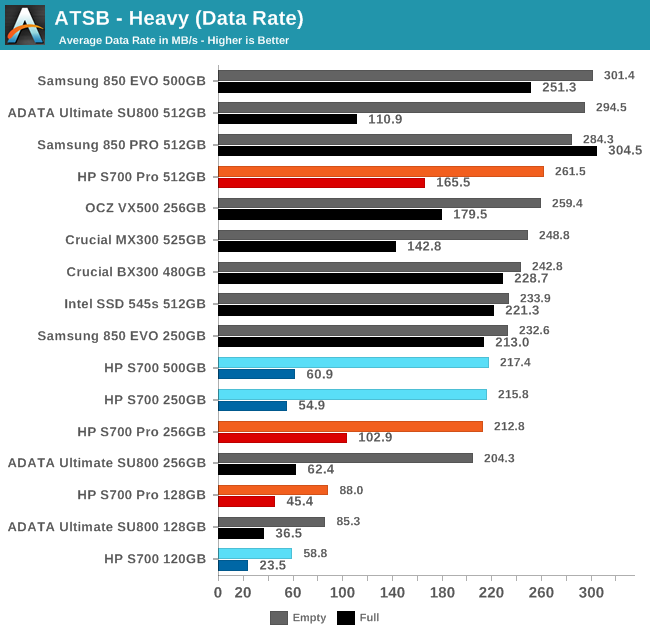
The different classes of SSD can be identified by how much slower they perform when full compared to their fresh out of the box state. On the Heavy test, the HP S700 and S700 Pro tend to deliver average data rates that are close to the mid-range and high-end SATA SSDs when the test is run on an empty drive. When the test is run on a full drive, the best SSDs are only slowed by a few percent, while the DRAMless HP S700's average data rate can drop to a quarter of its other score. The S700 Pro doesn't suffer as badly, and its full-drive performance penalty is much less severe than what the ADATA SU800 suffers from, even when the peak performance of the S700 Pro is lower.
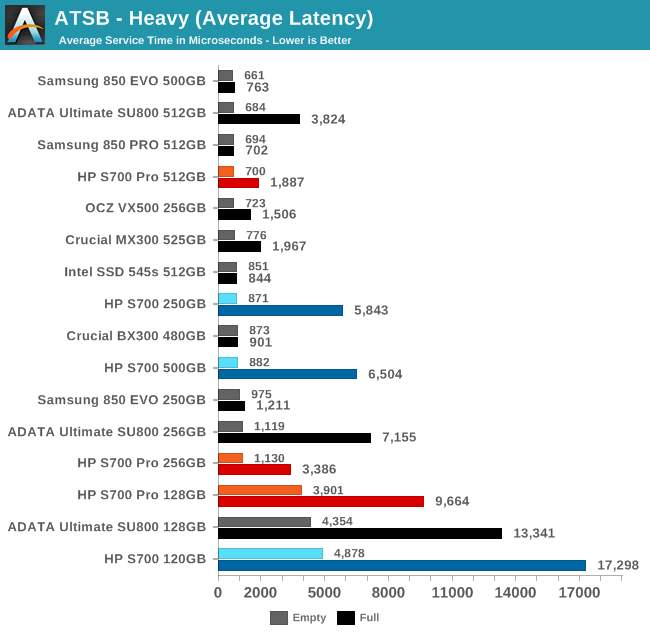
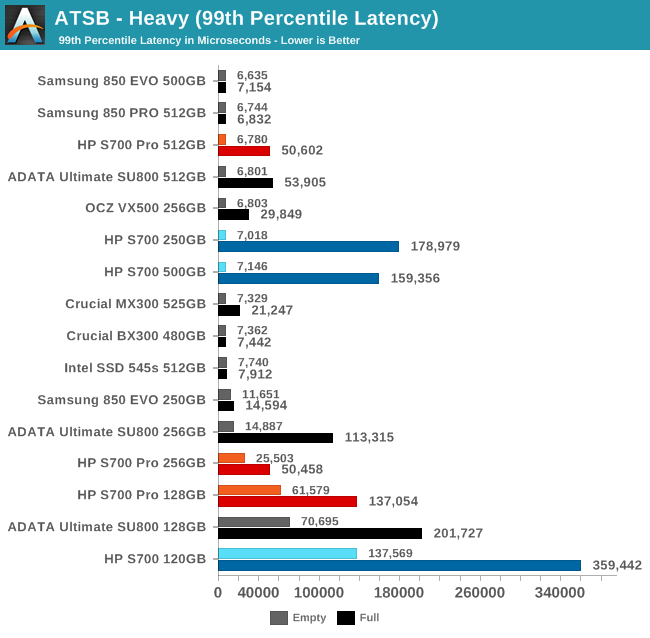
The average and 99th percentile latency scores make the full vs. empty performance differences even clearer. The S700 Pro's average latency is two to three times higher when full, and the S700's average latency can be over seven times higher when full. The differences are larger when considering 99th percentile latencies. The worst of these latency scores are well above the seek times of a mechanical hard drive, though overall performance is still far better than a hard drive can offer on a test with such a high average queue depth (by client workload standards). The 120GB HP S700 is the only HP drive that shows particularly poor latency compared to the competitors when the test is run on an empty drive.
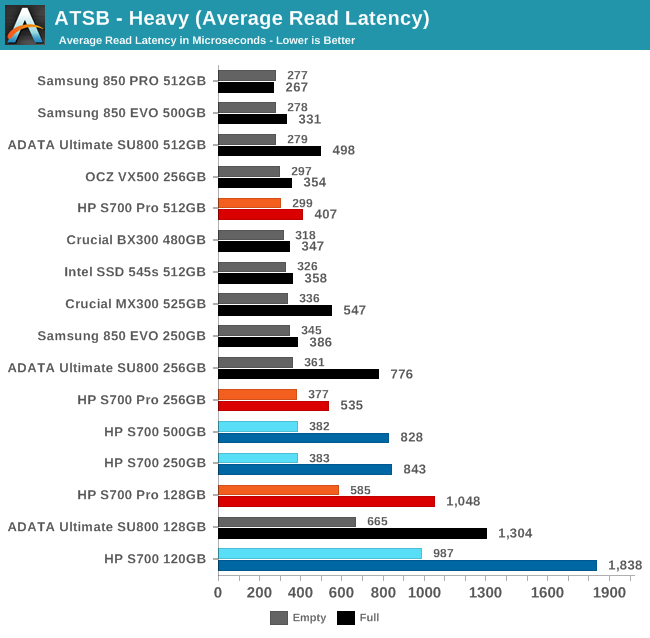
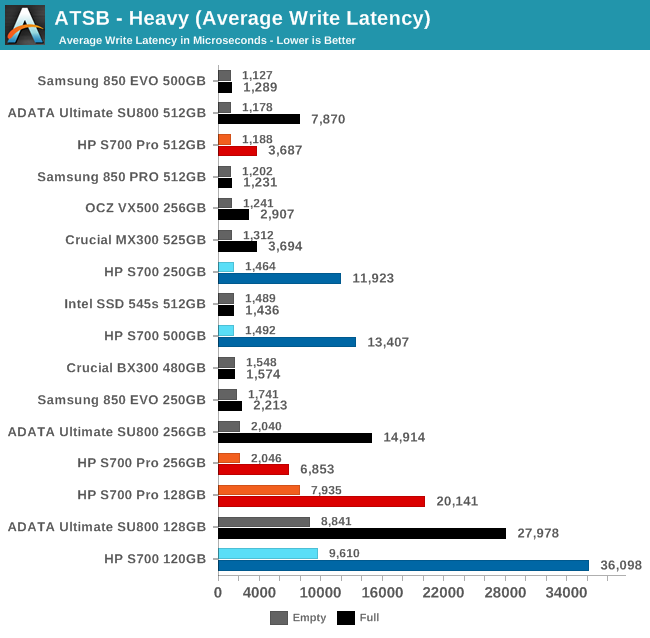
Average read latencies don't vary much among SATA drives when the Heavy test is run on an empty drive; only the 120GB-class drives are significantly slower than par. When the test is run on a full drive, read latencies are merely doubled in even the most strongly affected drives. On the write side, the 120GB-class drives have much higher latency than the rest even when the test is run on an empty drive. The HPs and the ADATA SU800 are the drives that show the most severe impact from the drive being full, with the HP S700 being affected the most and the S700 Pro being less affected than the ADATA SU800.
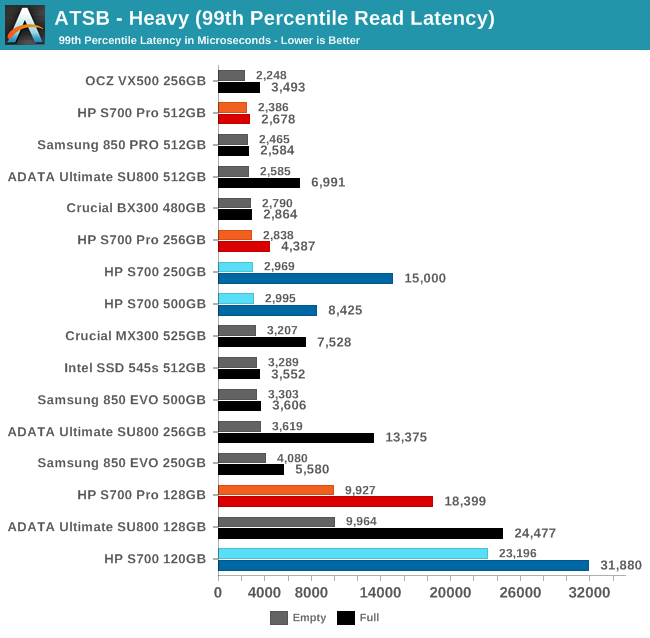
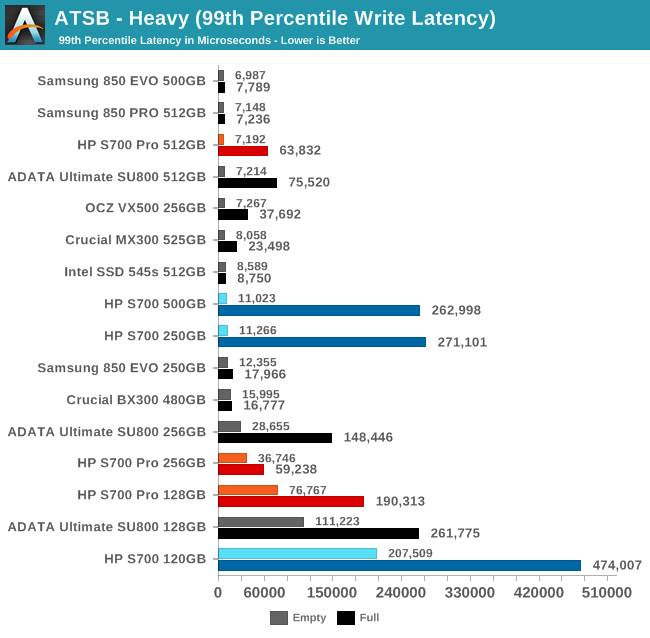
The rankings for 99th percentile read and write latencies are similar to the average latency rankings. The 120/128GB drives are substantially slower than the larger drives, where even the DRAMless HP S700 offers reasonable performance provided it isn't full.
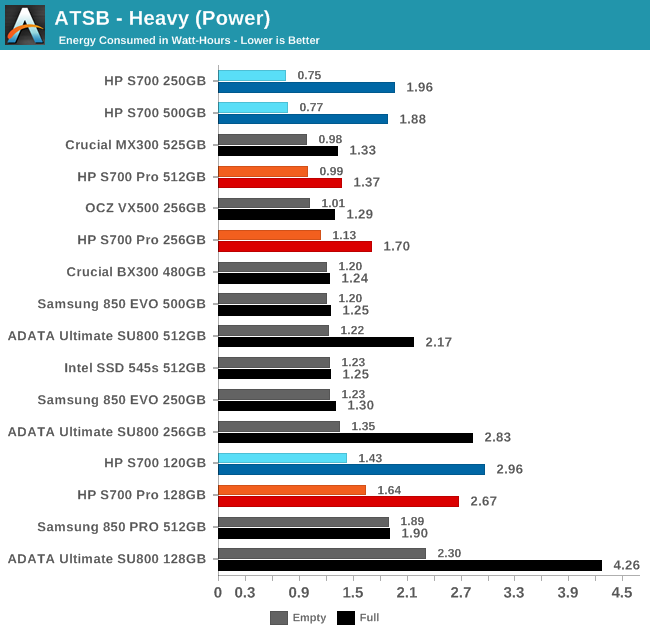
The larger two capacities of the HP S700 take the lead for energy efficiency when the Heavy test is run on an empty drive, and even when full they don't use significantly more energy than the Samsung 850 PRO. The 512GB HP S700 Pro also scores quite well in both scenarios, with energy usage only slightly higher than the Crucial MX300. In all cases, both HP models offer clearly better energy efficiency than the ADATA SU800.










54 Comments
View All Comments
sonny73n - Friday, September 8, 2017 - link
You should compare the 850 EVO with the BX300. I don't care whether the EVO has better controller but I will take a 2-bit per cell NAND over a 3-bit any day.mapesdhs - Wednesday, September 13, 2017 - link
I just keep picking up lightly used 840 Pro 256GB units, people have forgotten how good they were and still are. It's annoying they no longer appear in review charts. Even the Vertex4 and Vector are still good compared to modern models.barleyguy - Friday, September 8, 2017 - link
You seem to be comparing retail price to street price. HP has sales almost constantly. These might be $116 initially, but they'll be discounted very quickly to lower prices. I fully expect them to be competitive pricewise.r3loaded - Thursday, September 7, 2017 - link
Hurray, yet another 2017 SSD that gets utterly curbstomped by a Samsung SSD from 2015 on both performance and price.8steve8 - Thursday, September 7, 2017 - link
1. Who is buying SATA SSDs in 20172. Why is Anandtech putting so much effort into SATA SSDs in 2017
Billy Tallis - Thursday, September 7, 2017 - link
I've yet to hear from a vendor that their volume of NVMe drives has even come close to matching their volume of SATA drives, for either the retail consumer market or the client OEM market. Even in the enterprise market, NVMe isn't close to killing off SATA and SAS yet.We have new technologies launching in SATA products like the Intel 545s and Western Digital's 3D NAND SSDs. SATA SSDs are still more cost effective than NVMe SSDs, and will be until there have been plenty of low-end NVMe controllers like Phison E8 and Silicon Motion SM2263 on the market for quite a while.
Elstar - Thursday, September 7, 2017 - link
Also:1) most motherboards are still loaded with SATA connectors
2) most motherboards have few if any NVMe connectors (other than traditional PCIe)
3) SATA drives are often more friendly to "sneaker net" security.
8steve8 - Thursday, September 7, 2017 - link
yes, most motherboards have lots of SATA, but they also have a PCIe m.2 slot... hard to find one that doesn't.but who's buying SATA SSDs? It's an honest question.
on newegg i see a $99 240GB m.2 NVMe SSD, so who would recommend this 256GB SATA drive with a retail price of $169?
bji - Friday, September 8, 2017 - link
Nice straw man. Answer: nobody would buy either. They'd buy a $90 250GB Samsung EVO. I just did last night.cfenton - Monday, September 11, 2017 - link
Lot's of people don't have motherboards that support m.2. You're right that most new motherboards support m.2, but there are a whole lot of people out there with 2+ year old computers who might want more storage or a faster boot drive. SSDs, of any kind, still aren't common in many OEM products, especially at the low end. A SATA SSD is still going to beat the hell out of any HDD.